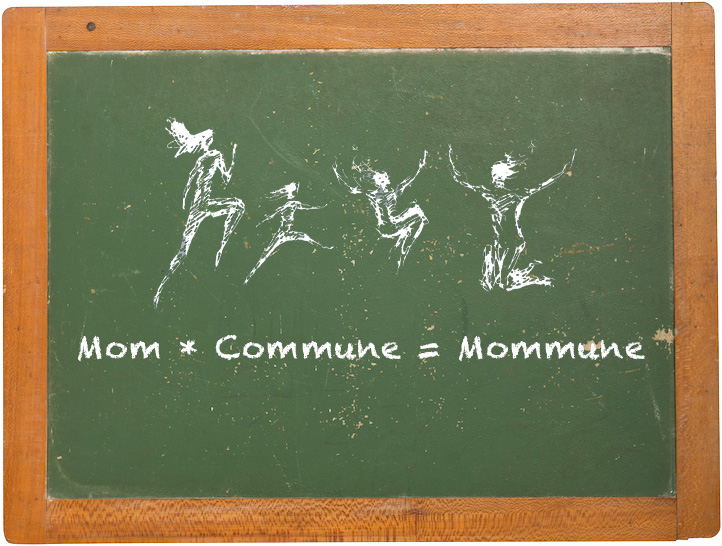
In August 2016, after living alone with my daughter for three years, I took a leap with two other moms with kids the same age, and we rented a 4-bedroom, 2-bathroom duplex in a hip section of lower Manhattan. I had met one of them through a mutual friend in the NY dance world. The other we met on coabode.org, a roommate matching service tailored to single moms that want to team up on housing, bills and childcare. Commune living is something I’ve been actively working on for over a decade. I knew since I was about 20, after breaking up with my second boyfriend, that marriage, the two-car garage, picket fence, and lifelong monogamy were not things I was cut out for. It wasn’t just about sexual partners — I’d found sharing much of life with just one other person, be it a roommate or boyfriend, utterly myopic. I wasn’t sure if I wanted children, and when I imagined it, I imagined it alone, or living in a big house full of my friends.
When my daughter was born, her father and I were sharing a 4-story brownstone with a dozen other adults (none of whom had children) in an ambitious attempt at architecting the postmodern commune. I learned a lot about group dynamics in that house, and by the time I was ready to make the leap again a few years after leaving him, I knew that living with other parents, with whom I could trade and split childrearing responsibilities was of paramount importance. I also knew I wanted to live exclusively with other moms. While the modern cry of women with children is to demand that our men equally share the burden of household and parenting responsibilities, I find this is regularly contradicted by a particular playground-mom-past-time: volleying stories of fatherly incompetence with the other exhausted moms. I wanted to live with other soldiers, not rookies.
Shared Values
Our first conference call (for one was arriving from out of the country) centered around a google spreadsheet I shared with the group for collaboration.
Don’t you just WISH you had done this with your spouse before moving in together? Love is blind, and makes us think things like that having great sex means living together will be a breeze. Which is why it’s actually very cool to have a platonic relationship with your co-parents — your perception is not clouded by having your brains fucked out.
Pros: This was incredibly helpful in determining what sort of apartments we should look for. It also served as a casual springboard for conversations about custody arrangements and annual income, which are not generally ice-breakers.
Cons: Not everyone was honest. Gee, kinda like dating. It constantly baffles me that people lie their way into relationships, but oh well, we accept these truths as self-evident. Hell, my ex lied to me about his income so I’d feel safe having a baby with him. Would that we could all accept that we are flawed, push past our fears of rejection, and courageously express our true selves to others right off the bat. Would that others weren’t so easily rattled by what is new and different — for it’s true that people often flee from what is unfamiliar. Everyone is a little crazy, you just have to find the people that are crazy like you. The sooner you can get it all out an uncomfortable on the table, the quicker you’ll weed out the people that you don’t jive with and zero in on the kindred nutballs.
The Setup
Real Estate
The three of us co-signed the rental lease, which meant we all had equal footing in terms of rights and obligations, and we all had to be transparent about income in order to figure out what we could afford and qualify for. Home or Lease ownership has a direct influence on your relationships. When I was co-owner of a house with my daughter’s father, living with a bunch of people with tenant status, the power imbalance was a clear obstacle to that fuzzy feeling of an egalitarian commune. If your roommate is also your landlord, you are less likely to knock on their door and tell them to turn down their music so you can sleep. Additionally, as the landlord, your assumed role as “fixer” means fielding copious requests for repairs, even when you’re also working a full-time job, taking care of a baby, and paying the equivalent of your tenants towards the mortgage each month. When it comes to decision-making, Democracy is slower and messier than a benevolent Monarchy, but I unquestionably prefer it. Regardless of how you arrange it, transparency and consensus are critical.
We measured all the bedrooms that the moms would occupy (the kids would share the fourth), divided the total rent by the combined square footage to ascertain a price per square foot, then multiplied that by the square footage of each bedroom to determine each occupant’s rent obligation. In retrospect, the prices between bedrooms were pretty drastic, and I think a better formula would have incorporated shared-use spaces into the equation as such:
bedroom price = bedroom area * total rent/total square feet
There are also factors like windows, privacy, balcony access, or which floor a room is on that can alter the perceived value of a space. Regardless of what your equation looks like, the numbers should “feel” right to everyone, and make it difficult to choose. You know you’ve got it wrong if one room has way higher demand.
(more…)



 On my bad days, I hate you. But most of the time, I feel sorry for you.
On my bad days, I hate you. But most of the time, I feel sorry for you. B was not the first professional I’d been with. The first was J, whom I’d met years before at my first orgy, at a London spa. I didn’t hire J — we took a liking to each other at the party, and he informed me as we chatted, that he did escort work. I’m sure if I was supposed to pay he would have said so, but if I’d had to I don’t think I’d have been interested. As we made small-talk in the hot tub, I felt his question on my thigh in the form of some ginger stroking. This shortly turned into necking, which eventually led to a tryst in the steam room that rather knocked my socks off. Friends would later ask me what he did that was so good. There was little I could point out beyond the serendipity of immediate, firey chemistry, but what always stuck with me happened while we were kissing in the hot tub; at one moment he pulled his mouth away and asked “So, what do you like?” And my twenty-something brain was struck dumb, for no man had ever asked me such a thing before fucking. It took me a few fumbling moments to come up with something, and his grinning acceptance of instruction led to a tense and rapid orgasm, in the nonchalant presence of other party-goers.
B was not the first professional I’d been with. The first was J, whom I’d met years before at my first orgy, at a London spa. I didn’t hire J — we took a liking to each other at the party, and he informed me as we chatted, that he did escort work. I’m sure if I was supposed to pay he would have said so, but if I’d had to I don’t think I’d have been interested. As we made small-talk in the hot tub, I felt his question on my thigh in the form of some ginger stroking. This shortly turned into necking, which eventually led to a tryst in the steam room that rather knocked my socks off. Friends would later ask me what he did that was so good. There was little I could point out beyond the serendipity of immediate, firey chemistry, but what always stuck with me happened while we were kissing in the hot tub; at one moment he pulled his mouth away and asked “So, what do you like?” And my twenty-something brain was struck dumb, for no man had ever asked me such a thing before fucking. It took me a few fumbling moments to come up with something, and his grinning acceptance of instruction led to a tense and rapid orgasm, in the nonchalant presence of other party-goers.